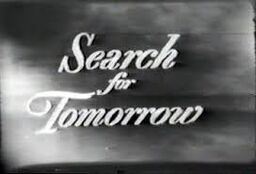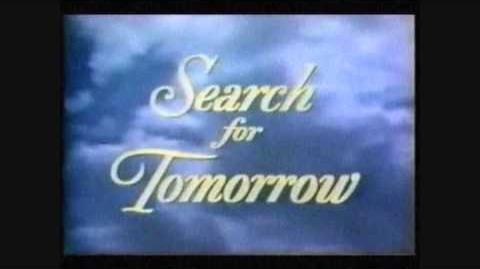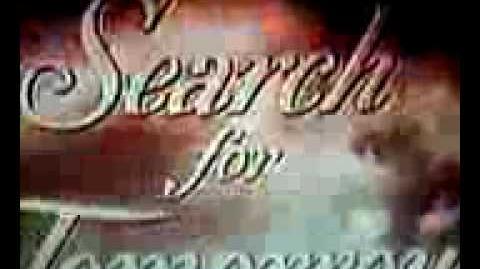
Search for Tomorrow was a CBS\NBC network soap opera created by Roy Windsor that first aired on CBS from September 3, 1951 until March 26, 1982 when it was moved to NBC where it continued to air until December 26, 1986, ending after 35 years on the air.
Show Background[]
1950s[]
For the show's duration, it was centered on a midwestern housewife named Joanne Gardner (played for the entire run by Mary Stuart), who lived in a fictional town called Henderson.
In the earlier years, Joanne's friends and next-door neighbors, Stuart and Marge Bergman (played by Larry Haines and Melba Rae) received much screen time as they commiserated with Joanne, usually over a cup of coffee at the kitchen table. At the beginning of the series, Stu and Marge had a young daughter named Janet (originally played by Ellen Spencer).
Most of Joanne's dilemmas in the early years were due to her dead husband Keith Barron's overbearing parents; they (most especially her mother in-law, Irene) never liked her and were quite content with seizing Joanne and Keith's daughter Patti (played longest by Lynn Loring) from the widow.
After Keith (played by John Sylvester White) died in 1952, Joanne started managing a hotel, The Motor Haven Inn.
Local thugs in town saw Joanne as soft because she was a woman and they attempted to take over the business as a front for Mafia dealings. Joanne's friend Rose Peabody (Lee Grant, Constance Ford and Nita Talbot), who was selling information to the Mafia, tried to poison a pot of soup that Joanne made, so her credibility would be tarnished.
In the end, she could not go through with it and poured the soup down the drain. A man named Arthur Tate (Terry O'Sullivan) helped Joanne with financial backing for the Inn. Arthur's Aunt Cornelia gave him the inheritance money but insisted on meddling in his affairs as she hated Joanne. Eventually, Arthur and Jo fell in love and were married in 1955.
1960s[]
After setting a record for the highest-rated soap opera of all time in its sophomore season, "Search for Tomorrow" was one of the highest-rated soaps in the 1950s, but began losing out to newer serials as the decade drew to a close.
When the show was in a ratings slump in 1960, Western-themed drama writers Frank and Doris Hursley were hired to write the show. Unfortunately, the new writers did nothing to help the ratings problem.
In 1963, the show's ratings were still stagnant and the duo decided to write out Joanne's baby (written into the storyline a few years previous while she was pregnant with son Jeffrey) by having him run in front of a speeding truck and die upon impact.
Stuart was unhappy with the decision and, in the book All My Afternoons, Stuart was paraphrased as saying that she played the grief scenes with so much conviction that even the makeup lady could not bear to watch her to see if her makeup was right. In the end, the ratings didn't rise, and Stuart threatened to quit unless Mr. and Mrs. Hursley were fired. At once the duo left the show and subsequently created the serial General Hospital for ABC the same year.
As the show progressed, Joanne's sister Eunice returned to town and seduced Joanne's second husband, Arthur Tate.
When a woman named Marian Rand came to town and sued Arthur for paternity, the stress surrounding this dilemma, coupled with personal troubles and the guilt of sleeping with Eunice caused him to have a fatal heart attack.
Joanne's daughter Patti grew into a teenager and became involved with drug-dealing gang members (incorporating a scathing viewpoint regarding America's counter-culture of the day). Joanne's friend Sam Reynolds (who was, ironically, Arthur's archenemy) proved his worth to Joanne by saving Patti when she was held at knifepoint. They were going to be married, but that event never came to pass. Actor Robert Mandan, who played Sam, did not renew his contract with the show.
1970s[]
In 1970, Joanne lost her eyesight, and Dr. Tony Vincente (Anthony George) helped her get it back. They fell in love and were married in 1972. In 1974, Mary-Ellis Bunim was appointed executive producer of "Search for Tomorrow" and as a result of Bunim wanting to take the show in a more youth-oriented direction, fewer stories involved Joanne. In 1975, Bunim was rumored to have the writers of the show kill off Joanne (after the death of Tony) which ended up not happening after vocal dissent from Stuart in the press. While the ratings took a slight dip when the series focused on younger viewers, the impact was not as heavy as expected.
Despite the show moving in a more youth-oriented direction, the character of Joanne embarked on a long-running story when she earned a foe in the ambitious schemer Stephanie Wilkins (Maree Cheatham).
In 1971, Stu and Marge's daughter Janet returned to the series and served as a peer to which Joanne's daughter Patti could relate.
Early in 1972, Marge's sudden death was written into the storyline (actress Melba Rae had died late the year before). Stu later married Ellie Harper (Billie Lou Watt) and helped Jo run the Hartford House, a modern incarnation of her old property, the Motor Haven Inn.
Examples of the "younger" stories included the maniacal Jennifer Pace (played by Morgan Fairchild); Jennifer shot and killed Joanne's sister Eunice after a vision of Eunice's husband John Wyatt (Val Dufour), whom Jennifer was having an affair with, told her to do the murderous deed.
Another popular story on the show was the budding romance between the characters of Steve and Liza Kaslo (Michael Nouri and Meg Bennett).
1980s[]
In March 1981, CBS made the decision to move "Search for Tomorrow" to 2:30 p.m./1:30 p.m. Central in 1981, after airing at 12:30/11:30 on CBS since its first episode thirty years before.
Procter and Gamble proposed the following to CBS: expanding the show to 45 minutes while reducing "As the World Turns" to the same length and discontinuing the half-hour access period at 1 p.m./Noon for local stations. CBS decided against eliminating the local time for the news, so "Search for Tomorrow" remained at a half hour and As the World Turns kept its full hour length.
Instead, the show relocated to the aforementioned 2:30/1:30 timeslot, despite P&G's lack of enthusiasm for the switch. In undertaking the move, CBS also returned "The Young and the Restless" which had expanded to a full hour in February 1980, to its original timeslot of Noon/11 a.m. Central.
Although the show continued to rank in the Top 10 at the time of its timeslot switch, its ratings dropped dramatically during the 1980/1981 season, from at 7.6 at the end of 1980 to a 6.3 at the end of 1981.
The ratings improved in the 2:30/1:30 p.m. slot (against ABC's "One Life to Live" and sister show "Another World" on NBC), moving back to a 6.8, but Procter and Gamble insisted that CBS return the show to its original timeslot and ass a response, however, CBS decided to cancel "Search for Tomorrow" in 1982 instead of renewing it.
In spite of CBS' decision to take the show off of its schedule, Procter and Gamble showed no interest in giving up on the show yet due to the show's modest but still steady ratings.
The company instead began seeking another home for it, as it had six and a half years earlier when CBS had dropped "The Edge of Night" (and it moved to the ABC network).
The switch to NBC (1982-1986)[]
CBS' final episode of "Search for Tomorrow" aired on March 26, 1982 and the show moved to NBC the following Monday, returning to its traditional 12:30/11:30 timeslot on CBS.
In an advertising campaign called "Follow the Search", the stars of the show wished for its loyal viewers to follow "Search for Tomorrow" to NBC.
However, CBS only allowed the advertisements if Procter and Gamble refrained from disclosing the network to which the show was moving in their advertisements (which had also been decreed for "The Edge of Night" before it moved to ABC in 1975).
At the end of the final CBS episode, veteran actors Mary Stuart and Larry Haines asked the audience to continue watching the show as it moved to "another network" and to locate the show and the network in their television listings.
However, as a result of the network and time slot switch, "Search for Tomorrow" now found itself going up against one of its former network mates "The Young and the Restless" on CBS instead of being part of a lineup that included the latter.
The show also found itself beaten regularly by the moderate but nonetheless higher-rated Ryan's Hope on ABC. Furthermore, while the 12:30/11:30 slot was less prone to pre-emptions than the Noon/11:00 slot would've been, some NBC affiliates televised other programs in the 12:30/11:30 slot, a practice going back to NBC's years of struggle in the 1970s. Thus, the show experienced a dramatic and ratings decline on NBC from which it never recovered.
When Search for Tomorrow first moved to 2:30/1:30 on CBS in 1981, its ratings were at a 6.8, which was half a percentage point higher from where they had been at the end the previous season (it finished in 8th place that same season). The move to NBC resulted in the show becoming the second-lowest rated soap opera on television with a 3.4 rating.
(A similar time slot switch plagued P&G's "The Edge of Night" ten years earlier. Coincidentally, both shows were moved into the same 2:30 PM slot and would end up leaving CBS for other networks; by this time, ABC aired "The Edge of Night" in the late-afternoon slot of 4:00pm Eastern).
In one scenario that never came to pass (as reported by TV Guide in June 1979), "Search for Tomorrow" would have moved to 3:30/2:30 Central (then used by daytime reruns of "M*A*S*H"); "The Young and the Restless" would have expanded to an hour in fall 1979 from 12:30-1:30/11:30-12:30; and "As the World Turns" and "Guiding Light" would have remained at their 1:30/12:30 and 2:30/1:30 start times, respectively, but those plans were ultimately scrapped.
Although "Search for Tomorrow" had switched networks, it was still produced at the CBS Broadcast Center at 524 West 57th St. in Manhattan until December 1982.
By late December 1982 or January 1983, NBC relocated the show's production to the Reeves Teletape Studios on Broadway and West 81st St. (which had relocated to the former WNET-TV studios at 9th Ave and 55th St.). However, in March 1985, production of the show moved to the former Edge of Night studios, the EUE/Screen Gems Studios at 222 East 44th St., where it remained for the rest of its run.
Search for Tomorrow's ratings on NBC remained only half as high as they had been on CBS, even in the 2:30/1:30 slot. By this time, few viewers had interest in Joanne's final marriage to Martin Tourneur (John Aniston) which had taken place while the series still called CBS home.
The show finished second to last in the ratings again at the end of its first full television season on NBC, finishing ahead of the failing "The Doctors" & actually finishing in a tie with "Texas", but both of those shows failed to make it through the 1982-83 season.
By 1984, the show mainly focused on two new families: the Kendalls and the McClearys. The McCleary family was headed by Matt McCleary, his twin brother Malcolm McCleary (Patrick Tovatt), Kate McCleary (Jo Henderson, later Maeve McGuire), brothers Hogan McCleary (David Forsyth), Cagney McCleary (Matthew Ashford), Quinn McCleary (Jeffrey Meek), and sister Adair McCleary (Paige Hannah, later Susan Carey Lamn). The Kendall family was headed by Estelle Kendall (Domini Blythe), Lloyd Kendall (Peter Haskell, then by Joe Lambie, later Robert Reed), and Mike Kendall (Thomas Sullivan), brothers Alec Kendall (Robert Curtis Brown), Chase Kendall (Kevin Conroy, later Robert Wilson), Steven Kendall (Phillip Brown, Steve Lindquist), and sister Theresa Rebecca (T.R.) Kendall (Jane Krakowski).
In an interview for Guy MacMillin's The Videot, Mary Stuart complained: "They have created a new program and they're calling it Search for Tomorrow." Stuart also believed that she was being eased out by the character of Kate McCleary. Regardless of the writers' intentions, ratings continued to fall.
At the end of the 1983-1984 television season, "Search for Tomorrow" finished last in the ratings with a 3.2. It did climb out of the ratings cellar at the end of the following television season, but this was largely due to the continuing struggles of "The Edge of Night" (which ended on December 28, 1984 with a 2.6 rating).
The show returned to the bottom of the ratings list thereafter, this time with an anemic 2.9 rating for the 1985-1986 television season and it remained in last place from there on in. Only after a memorable attempt to bring up the ratings did P&G finally decide to pull the plug: A flood washed away the whole town of Henderson except for Joanne's residence and business.
On December 26, 1986, the final episode ended with senior characters Stu Bergman and Joanne Tourneur talking about the future. Stu asked Joanne what she was searching for, and she answered: "Tomorrow, and I can't wait."
This segment was followed by a taped piece in which the cast thanked the show's viewers for their loyalty over the past 35 years, ending with a slightly-tearful Mary Stuart saying: "Thank you...thank you all. They were wonderful years" and saluting the audience goodbye.
The show also ended with the song "We'll Be Together Again" as performed by Lou Rawls.
Cast Members[]
Many well-known film and television actors appeared on "Search for Tomorrow" during its 35-year run:
- Barbara Babcock (Gwen Delon)
- Kevin Bacon (Todd Adamson #2)
- Angela Bassett (Selina McCulla)
- Domini Blythe (Estelle Kendall)
- Olympia Dukakis (Dr. Barbara Moreno)
- Sandy Duncan (Helen)
- Morgan Fairchild (Jennifer Pace)
- Sylvia Field (Pearl March #2)
- Jennifer Gatti (Angela Moreno)
- Cynthia Gibb (Susan "Suzi" Martin Wyatt)
- John Glover (Vargas)
- Joanna Going (Evie Stone)
- Lee Grant (Rose Peterson #1)
- Larry Hagman (Curt Williams)
- Peter Haskell (Adam Kendall #1)
- Audrey Landers (Connie)
- Audra Lindley (Sue Knowles)
- Lyn Loring (Patti Barron Tate Whiting #1)
- Barbara Luna (Anna Ryder)
- Tina Johnson (Rhonda Sue Huckaby)
- John James (Tom "Junior" Bergman)
- Ken Kercheval (Dr. Nick Hunter #2)
- Kevin Kline (Woody Reed)
- Don Knotts (Wilbur Peterson)
- Jane Krakowski (Theresa Rebecca "T.R." Kendall)
- George Maharis (Bud Gardner)
- Melissa Manchester (herself)
- Robert Mandan (Sam Reynolds #1)
- Kay Medford (Hester Walsh)
- Stephanie Mills (herself)
- Meg Myles (Mavis Stone)
- Robert Reed (Lloyd Kendall #2)
- Wayne Rogers (Slim Davis)
- Susan Sarandon (Sarah Fairbanks)
- Pat Stanley (Marin Malin)
- Tom Sullivan (Michael Kendall)
- Michael Zaslow (Dick Hart)
Accolades[]
Daytime Emmy Awards
Wins
| Category | Recipient | Role | Year |
|---|---|---|---|
| Daytime Emmy Award for Outstanding Lead Actor in a Drama Series | Larry Haines Val Dufour |
Stu Bergman John Wyatt |
1976 |
| Daytime Emmy Award for Outstanding Supporting Actor in a Drama Series | Larry Haines | Stu Bergman | 1981 |
Other Categories
- 1986: "Outstanding Achievement in Music Direction and Composition for a Drama Series"
- 1978: "Outstanding Individual Achievement in Daytime Programming: Costume Designer" (Connie Wexler)
Other Awards
- Writers Guild of America Award for Best Television Writing in Daytime Serials (1974, 1975, 1985)
Video[]

Search for Tomorrow Opening Credits (1951-1986)

Search For Tomorrow 1967 promo

Search for Tomorrow 1979 promo

Search For Tomorrow & The Young & The Restless Promo (April 1981)
